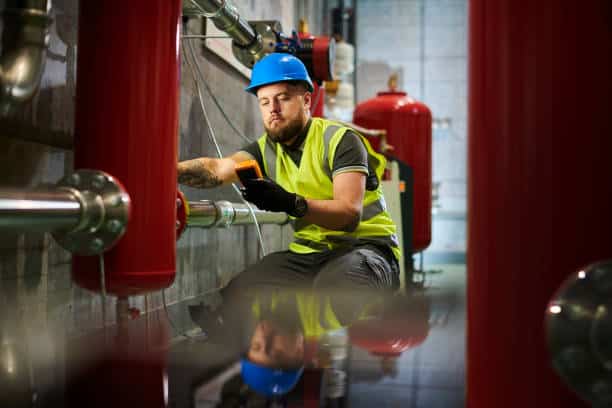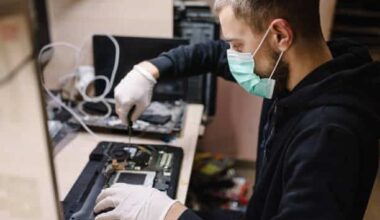Table of Contents
- What is HVAC Technician?
- What does an HVAC Technician do?
- Here is some detailed information about the significant components of an HVAC technician’s job:
- Are you fit to be an HVAC technician?
- How is the workplace of an HVAC Technician?
- HVAC Technician Salary
- Education, Training, and Certification
- HVAC Technician Skills and Competencies
What is HVAC Technician?
HVAC is an abbreviated form for heating, ventilation, and air-conditioning. It is the job of a qualified HVAC technician to install, maintain, and repair heating, ventilation, air conditioning, and refrigeration systems controlling the temperature and air quality in buildings.
Although they are trained in all three components, some HVAC technicians sometimes choose to work solely with heating, air conditioning, or refrigeration systems. In some cases, they specialize in installation, maintenance, or repair. They may also specialize in a particular kind of equipment, such as water-based heating systems, solar technology systems, or commercial refrigeration.
What does an HVAC Technician do?
What does an HVAC technician do? The answer to the question will vary somewhat depending on the industry of employment, position, and specialty. What remains the same is the essence of the work that the technicians do.
Heating and air conditioning systems basically control the temperature, humidity, and general air quality in homes, office buildings, hospitals, schools, factories, stores, and other facilities. They help us stay comfortable and healthy by providing a climate-controlled environment. Refrigeration systems can store and move food, medicine, and other perishable items.
A regular workday in the life of an HVAC technician begins with learning about the job that needs to be done. Employers can assign technicians to meet customers to resolve any HVAC-related issue they have. Customers may directly contact self-employed technicians. The job can be to repair a leaking pipe, replace a damaged or defective mechanical component, or adjust equipment settings for better performance. Essentially, HVAC techs do one or more of the following:
- Adjusting system controls to balance system
- Assembling, positioning, and mounting HVAC equipment
- Linking HVAC equipment to fuel, water, or refrigerant sources
- Cutting or drilling holes in the structure of the building
- Enhancing HVAC system performance by changing filters, cleaning ducts, or refilling refrigerants
- Installing, linking or adjusting thermostats, humidistats, or timers
- Design, layout, and install low voltage electrical wiring
- Note and report time, faults, deficiencies, materials, and other occurrences on work orders
- Repairing or replacing defective equipment
- Run after-hours calls as required
- Studying blueprints and other specifications
- Testing electrical circuits or components for continuity
- Testing pipe or tubing joints or linkages for leaks
Here is some detailed information about the significant components of an HVAC technician’s job:
-
Ductwork
In jobs void of issues from union membership, an HVAC technician may complete the assembly and installation of the ductwork distributing the heated or cooled air from the HVAC system.
This involves cutting the sheet metal to create the ducts, linking the ducts to the HVAC unit, and setting up the ductwork in the building. It may also have the installation of registers where the ductwork links to individual spaces.
Some HVAC technicians choose to sell service contracts, providing constant maintenance of heating and cooling systems. In some cases, other tradespeople will work with HVAC technicians to help install or repair cooling and heating systems.
For instance, on a large air conditioning installation job, especially one in which union contracts cover workers, ductwork might be executed by sheet metal workers and duct installers, or the electrical work by electricians. Repairs to window air conditioners or household refrigerators are usually carried out by home appliance repair services versus HVAC technicians.
In line with the increasing cost of power, building operators are increasingly concerned with conserving energy. Practical energy usage, therefore, has become an essential aspect of HVAC/R work. This means that technicians may be requested to check the energy usage of HVAC/R systems, install smart thermometers or green heat pumps, upgrade systems, and monitor energy usage periodically.
-
Installation
Basically, an HVAC technician will install a unit in line with the specifications of an architect or architectural engineer. Before installing, a technician will complete the calculations needed to decide which HVAC system is relevant. Once the unit is installed, the technician will test the system’s piping and linkages and link the HVAC unit to the ductwork or distribution network.
Refrigerant technicians, usually certified by the Environmental Protection Agency (EPA), will help charge the system with refrigerant.
-
Maintenance
For efficiency, heating, ventilation, and cooling systems must undergo regular maintenance checks, usually twice yearly, at the beginning of spring and the onset of autumn. These checks, done by an HVAC technician, often include testing and cleaning the blower fan, checking the coolant level in the cooling system, as well as testing the system’s thermostat and operation.
Another thing to note is advising customers on how to prevent future issues and appropriately maintain equipment by, for instance, constantly oiling components or changing filters.
Basically, the HVAC technician has three main objectives: i) Prevent problems. ii) Save money. iii) Stay comfortable. These technicians may also collaborate with sales and engineering departments in order to develop products that respond to customers’ needs and market opportunities.
-
Repair
An HVAC technician deals with issues about the HVAC unit itself, thermostats and other controls, the air handling system, compressors, and refrigerant levels.
-
Regulation
Regardless of the job done, HVAC technicians should follow government regulations and local HVAC codes about the handling, conservation, recovery, disposal, and recycling of refrigerants and other fluids.
-
The tools of an HVAC Technician
Based on the task at hand, HVAC technicians deploy many different tools. When installing systems, they utilize screwdrivers, pipe cutters, wrenches, and other basic hand tools. To test or install complex system parts, technicians may have to use more sophisticated tools, including carbon monoxide detectors, combustion analyzers, voltmeters, and acetylene torches.
Are you fit to be an HVAC technician?
So, what makes an HVAC technician? They can have distinct personalities. The technicians are often realistic individuals, meaning they are independent, stable, genuine, persistent, thrifty, and practical. They like tactile, physical, athletic, or mechanical tasks. They can also be investigative, meaning they are introspective, intellectual, and inquisitive.
How is the workplace of an HVAC Technician?
Work schedules for HVAC technicians are primarily full-time. However, the nature of their work means that evening, weekend, overtime, and irregular on-call hours are expected. At the height of heating and cooling seasons, a number of them may work overtime.
When servicing equipment, a technician has to dispose of harmful refrigerants deployed in air-conditioning and refrigeration. This includes using special recycling equipment. Refrigerants like chlorofluorocarbon (CFC) or hydrochlorofluorocarbon (HCFC) are regarded as 100% ozone-depleting. They can be acquired, installed, and extracted by a certified HVAC technician.
Several HVAC technicians frequently find themselves working in cramped and uncomfortable spaces, at extreme heights, and sometimes in dangerous conditions like severe weather (to service outdoor heat pumps and heat exchangers).
They encounter many potential hazards, including electrical shocks, burns, muscle strains due to lifting heavy equipment, and breathing issues caused by the harmful chemicals and refrigerants they handle, which may prompt the question: “What Can I Do If I Hate My Job? Here Are 10 Things“
Based on the United States Bureau of Labor Statistics, most HVAC techs are usually employed by plumbing, heating, and air-conditioning contractors. A few are self-employed, teach at trade schools, or work in retail trade or wholesale trade. To be more precise, HVAC technicians work in the following industries:
- Building Equipment Contractors
- Direct Selling Establishments
- Hardware Merchant Wholesalers
- Plumping & Heating Equipment/Supplies Merchant Wholesalers
- Commercial and Industrial Machinery and Equipment Repair/Maintenance
- Colleges, Universities, and Professional Schools
- Personal and Household Goods Repair/Maintenance
- Aerospace Product and Parts Manufacturing
- Natural Gas Distribution
- Wired Telecommunications Carriers
HVAC Technician Salary
This career offers decent pay that covers a pretty extensive range based on skills and location. Based on the U.S. Bureau of Labor Statistics, below the average pay of an HVAC technician.
- Median Yearly Salary: $47,610 ($22.89/hour)
- Top 10% Yearly Salary: Over $76,230 ($36.65/hour)
- Bottom 10% Yearly Salary: Below $29,460 ($14.16/hour)
Education, Training, and Certification
You will likely need formal training to work as an HVAC technician.
- Education: Many employers choose to hire workers who have had post-secondary instruction at a trade or technical school. The United States Armed Forces also provide HVAC training.
- Apprenticeships: Also, employers will hire candidates who have completed a three-to-five-year paid apprenticeship. Apprentices get their skills in the classroom or at the job.
- Licensing: Some states and localities demand that HVAC technicians be licensed. This often means passing a written test.
HVAC Technician Skills and Competencies
Alongside the technical skills, you will get through formal training, some soft skills and personal qualities can add to your success in this occupation.
- Critical thinking: This enables you to weigh different solutions to a problem and determine the best one.
- Listening: It is crucial that you completely understand what your clients tell you about their issues so you can resolve them.
- Physical strength and adroitness: You should be able to lift up to 50 pounds easily and carry and maneuver heavier items, either with help or appropriate devices.
- Speaking: You will have to be able to share information with your coworkers and clients articulately.
- Time management: Meeting the stipulations of a busy schedule means managing your time well.






